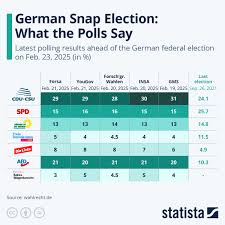Latest Insights from German Elections Polls

Introduction: The Significance of German Elections
The upcoming German elections are pivotal for both national and European politics. As one of the largest economies in Europe, the political landscape in Germany can influence economic policies, international relations, and social reforms across the continent. With recent polls indicating shifts in public sentiment, understanding these developments is crucial for observers and stakeholders alike.
Recent Polling Trends
As of October 2023, various polling agencies have reported significant movements among Germany’s major political parties. The Social Democratic Party (SPD), led by Chancellor Olaf Scholz, is currently facing challenges from the Christian Democratic Union (CDU) as they strive to regain influence after suffering losses in the previous election. Recent surveys suggest that the CDU is gaining traction with approximately 29% of the vote, compared to the SPD’s 25%. Meanwhile, the Greens and the Liberal Democrats (FDP) maintain steady support at around 17% and 11%, respectively.
Voter Concerns and Preferences
Polls indicate that voters are increasingly concerned about economic stability, climate change, and public health in the aftermath of the COVID-19 pandemic. A significant portion of the electorate has shifted their priorities, with 45% of respondents citing economic recovery as their primary concern. In contrast, climate-related issues have also surged to the forefront, particularly among younger voters. The Greens have capitalised on this sentiment, appealing to environmentally conscious citizens and promoting sustainable policies.
Impact of Recent Events
Political events, including the ongoing energy crisis exacerbated by the war in Ukraine, have influenced public opinion considerably. Many voters express uncertainty about the government’s ability to navigate these challenges, which may result in unpredictable election outcomes. Moreover, the rise of populist movements in response to economic grievances has sparked debates surrounding immigration and integration, further complicating the political landscape.
Conclusion: Future Considerations
The current polling landscape suggests an evolving political theatre in Germany as parties jostle for voter support ahead of the elections. With shifts in public opinion, voter engagement remains paramount. Observers anticipate that the CDU may regain power, yet the SPD and other parties could still pose a formidable challenge. As the election date approaches, attention will be drawn to how effectively these parties can communicate their policies and resonate with the electorate’s evolving priorities.
In conclusion, the upcoming German elections represent more than just a political exercise; they are a barometer for broader trends in European politics. As polls continue to fluctuate, all eyes will be on Germany to see how these dynamics unfold in the voting process.









